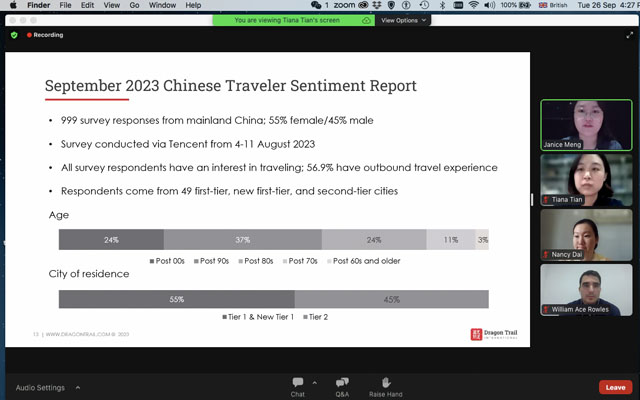Dragon Trail International (DTI) and ForwardKeys’ latest webinar on Chinese Tourism Outlook: October Holiday and Beyond on September 26 revealed a couple of unexpected findings.
Iceland has become a hotspot all thanks to social media and was the most searched destination on popular Chinese platforms like Xiaohongshu, Douyin and Weibo, according to Janice Meng, DTI market research analyst.

Meng noted the photos and videos of active volcanoes and beautiful scenery placed Iceland, which had never made it to the top 10-destination list, in the number five spot.
“More and more, social media is making an impact on trip planning and traveller behaviour,” she added.
On where they want to visit this year for the first time, a high proportion of Chinese travellers picked South Korea, Japan (when the survey was conducted before news of Japan’s release date of treated nuclear water from August 24), Thailand, Hong Kong, Iceland, Macau, the Maldives, France, Singapore and the UK.
Noticeably, Thailand has fallen off the top 10 list based on the August survey of some 1,000 respondents, and Nancy Dai, China market expert, ForwardKeys, commented all eyes were on its recovery with the destination offering visa-free entry from September 25 until February 2024, straddling the Spring Festival high season.
Dai observed: “We will have to wait and see the impact of Thailand’s visa-free entry and what the airlines announce in the last week of October for the winter season.”
In taking a more detailed look at safety in 16 destinations, she said Hong Kong and Singapore were perceived to be “much more safe” and “less unsafe”.
Western countries like Australia also improved and the safety perception of the US described as “terrible in the past” improved considerably.
She continued: “Thailand’s safety ranking dropped, with 51 per cent saying it was now unsafe during to news of kidnapping, human trafficking and Chinese being robbed and the reason for joining tour groups and buying travel insurance.”
September 29 to October 6 marks the last week-long holiday in China this year.
Tiana Tian, DTI market research analyst said Trip.com reported that outbound travel hotel searches increased by 20 per cent and flight searches nearly recovered 100 per cent compared to 2019.
In addition, she said Tongcheng Travel noted the average price of international air tickets on September 29 was 72 per cent higher than the average price during summer.
According to Dai, the revival of outbound travel was “unaffected by China’s economic downturn, with travellers favouring longer stays and 61 per cent spending more than six nights away”.
ForwardKeys is also tracking smaller group sizes with solo, couples and families of three to four going away between September 23 and October 8 as of September 6, compared to 11 per cent for groups with five or more people.
It added that Hong Kong, Macau, Malaysia, Singapore and Indonesia were the most resilient destinations in Asia for outbound China travel with +52 per cent, +36 per cent, +10 per cent, -11 per cent and -33 per cent arrivals respectively, based on tickets issued on September 15 for travel between September 23 and October 8, compared to 2019.




















